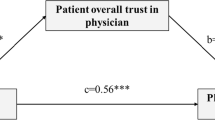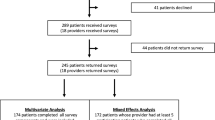Abstract
Purpose
The recently introduced Cancer Communication Assessment Tool (CCAT-PF) measures congruence in patient–caregiver communication and was initially validated in lung cancer patients. Contributing to a greater proportion of the variance in the conflict scores, primary caregivers were hypothesized to experience greater stress. For a detailed understanding of conflicting communication patterns of cancer-affected families, our study aimed for psychometric validation of the CCAT-PF in a sample covering heterogeneous tumor entities.
Methods
Subsequent to a cross-sectional survey of 189 pairs of cancer patients (31 % gastrointestinal, 34 % lung, and 35 % urological) and their caregivers’ exploratory factor analysis with principal component condensation and varimax rotation was conducted (response rate, 74.2 %). Reliability and construct validity were assessed calculating Cronbach’s α and Pearson correlation coefficients for CCAT-P and CCAT-F scales and related constructs, respectively.
Results
Cancer-related communication according to the CCAT-PF can be subdivided into four factors including the scales Disclosure, Limitation of treatment, Family involvement in treatment decisions, and Continuing treatment. Reliability ranged from α = .51–.68. The Disclosure scale, describing poor cancer-related communication of the patient, was correlated with patient’s distress (QSC-R10: r = .30, p < .0001), unmet needs in several areas (SCNS-SF-34: r = .25–.32, p < .001), and negatively with social/family well-being (FACT: r = −0.31, p < .0001). Higher scores on the scale were significantly associated with considerable decrements in emotional well-being especially for caregivers perceiving patients’ disclosure as problematic.
Conclusions
The Disclosure scale originating from the CCAT-PF emerged as a short, valid, and reliable stand-alone instrument for identifying conflicting communication in patient–caregiver–dyads at risk.
Similar content being viewed by others
References
Lewis FM (2009) The family’s “stuck points” in adjusting to cancer. In: Holland JC, Breitbart WS, Jacobsen PB (eds) Psycho-Oncology. Oxford University, New York, pp 511–515
Manne SL et al (1999) Spousal negative responses to cancer patients: the role of social restriction, spouse mood, and relationship satisfaction. J Consult Clin Psychol 67(3):352–361
Burns CM et al (2007) Fluctuating awareness of treatment goals among patients and their caregivers: a longitudinal study of a dynamic process. Support Care Cancer 15(2):187–196
Siminoff LA et al (2008) The Cancer Communication Assessment Tool for Patients and Families (CCAT-PF): a new measure. Psychooncology 17(12):1216–1224
Siminoff LA et al (2006) Measuring discord in treatment decision-making; progress toward development of a cancer communication and decision-making assessment tool. Psychooncology 15:528–540
Bonett DG (2002) Sample size requirements for testing and estimating coefficient alpha. J Educ Behav Stat 27(4):335–340
Escobar Pinzon LC et al (2010) End-of-life care in Germany: study design, methods and first results of the EPACS study (Establishment of Hospice and Palliative Care Services in Germany). BMC Palliat Care 9:16
Book K et al (2011) Distress screening in oncology—evaluation of the Questionnaire on Distress in Cancer Patients—Short Form (QSC-R10) in a German Sample. Psychooncology 20(3):287–293
Kroenke K et al (2009) An ultra-brief screening scale for anxiety and depression: the PHQ-4. Psychosomatics 50(6):613–621
Girgis A, Lambert S, Lecathelinais C (2011) The supportive care needs survey for partners and caregivers of cancer survivors: development and psychometric evaluation. Psychooncology 20(4):387–393
Cella DF et al (1993) The Functional Assessment of Cancer Therapy scale: development and validation of the general measure. J Clin Oncol 11(3):570–579
Cella DF et al (1995) Reliability and validity of the Functional Assessment of Cancer Therapy-Lung (FACT-L) quality of life instrument. Lung Cancer 12(3):199–220
Robinson BC (1983) Validation of a Caregiver Strain Index. J Gerontol 38(3):344–348
Nunnally JC, Bernstein IH (1994) Psychometric theory, 3rd edn. McGraw-Hill, New York
Fife BL et al (2013) Partner interdependence and coping with life-threatening illness: the impact on dyadic adjustment. J Fam Psychol 27(5):702–711
Kornblith AB et al (2006) Cancer-related communication between female patients and male partners scale: a pilot study. Psychooncology 15(9):780–794
Lo C et al (2013) Couples facing advanced cancer: examination of an interdependent relational system. Psychooncology 22(10):2283–2290
Northouse LL et al (2013) Randomized clinical trial of a brief and extensive dyadic intervention for advanced cancer patients and their family caregivers. Psychooncology 22(3):555–563
Conflict of interest
In accordance with the Recommendations for the Conduct, Reporting, Editing, and Publication of Scholarly Work in Medical Journals proposed by the International Committee of Medical Journal Editors (ICMJE), the authors’ declare that there is no conflict of interest. The study was conducted without involvement of a sponsor.
The authors had full access to all of the data in this study and take complete responsibility for the integrity of the data and the accuracy of the data analysis.
Author information
Authors and Affiliations
Corresponding author
Rights and permissions
About this article
Cite this article
Haun, M.W., Sklenarova, H., Winkler, E.C. et al. Assessing patient–caregiver communication in cancer—a psychometric validation of the Cancer Communication Assessment Tool (CCAT-PF) in a German sample. Support Care Cancer 22, 2473–2478 (2014). https://doi.org/10.1007/s00520-014-2241-0
Received:
Accepted:
Published:
Issue Date:
DOI: https://doi.org/10.1007/s00520-014-2241-0




